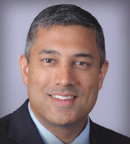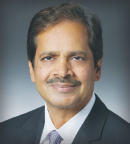The members of the American Society for Radiation Oncology (ASTRO) recently elected three new officers to ASTRO’s Board of Directors: Sameer Keole, MD, FASTRO, as President-Elect; Wendy Woodward, MD, PhD, FASTRO, as Science Council Vice Chair; and Vivek S. Kavadi, MD, MBA, FASTRO, as Health Policy Council Vice Chair. The officers will begin their terms in October during ASTRO’s 65th Annual Meeting in San Diego.
During his 4-year term on the Presidential track, Dr. Keole will represent the society’s 10,000 members, who include physicians, physicists, biologists, dosimetrists, radiation therapists, nurses, and other professionals involved in radiation oncology care. Dr. Keole will serve 1 year as President-Elect, followed by 1 year as President, where he will oversee the 2025 ASTRO Annual Meeting; he then will serve 1-year terms as Board Chair and Immediate Past Chair. Dr. Woodward and Dr. Kavadi will serve 2-year terms as Vice Chairs, followed by 2-year terms as Chairs of their respective councils.

Sameer Keole, MD, FASTRO

Wendy Woodward, MD, PhD, FASTRO

Vivek S. Kavadi, MD, MBA, FASTRO
More About the President-Elect
Dr. Keole is a radiation oncologist at the Mayo Clinic in Scottsdale, Arizona, and also sees patients at Phoenix Children’s Hospital. He focuses on treating pediatric patients as well as adults diagnosed with brain, spine, and other central nervous system tumors.
Dr. Keole previously served on the ASTRO Board as Head of the Government Relations Council, helping lead ASTRO’s work with Congress and other policymakers on prior authorization and Medicare payment reform. He is a longtime champion of fair reimbursement for physicians from all practice settings, and he will continue this advocacy as ASTRO works to implement the recently introduced Radiation Oncology Case Rates program, with a goal to achieve payment stability through legislative action.
In addition to efforts on the Hill, Dr. Keole will focus on boosting collaboration within radiation oncology and with other oncology fields, focusing on policies that support physicians in both community and academic practices. “Excellent clinical care can be provided in any practice setting, and innovations in how we treat cancer can be achieved in many different environments,” Dr. Keole said. “I am confident that by working together, we can make significant progress in the fight against cancer for the benefit of patients worldwide.”
Other priorities for Dr. Keole include increasing partnerships with industry and other stakeholders on radiopharmaceuticals; looking more closely at the impact of workforce issues on early-career physicians; and drawing attention to the role of radiation therapy for patients with nonmalignant conditions. “More than 1 million people receive radiation therapy each year to treat cancer, and potentially many more could benefit from this important modality,” he said.
More About the Science Council Vice Chair
Dr. Woodward is Professor and Interim Chair of Breast Radiation Oncology at The University of Texas MD Anderson Cancer Center, where she also serves as Executive Director of the Morgan Welch Inflammatory Breast Cancer Clinic and Research Program. A leading expert in the treatment and biology of breast cancer, Dr. Woodward leads a federally funded translational research laboratory, co-leads translational science efforts related to breast cancer for NRG Oncology, and is a member of the Breast Oncology Local Disease Task Group of the National Cancer Institute breast cancer steering committee working group.
During her Board tenure, Dr. Woodward will help direct ASTRO’s scientific initiatives, including its grant and fellowship programs for early-career researchers. “With efforts to strengthen the innovation ecosystem, foster diverse research teams, increase collaboration and partnership, and support health services research, we can drive meaningful advancement in radiation oncology,” said Dr. Woodward.
More About the Health Policy Council Vice Chair
Dr. Kavadi is Chief Radiation Oncology Officer for The US Oncology Network and a radiation oncologist at Texas Oncology. He is also the current Chair of ASTRO’s Health Policy Committee and Payer Relations Committee.
In his Board role, Dr. Kavadi will continue his long-standing advocacy of payment reform for radiation oncology, helping lead ASTRO’s efforts to implement the Radiation Oncology Case Rates payment program, as well as the Society’s work to reduce prior authorization hurdles that can unnecessarily delay the initiation of cancer treatment. “Physician advocacy is key to raising awareness of the financial and administrative pressures facing radiation oncology today,” said Dr. Kavadi. “We can help policymakers truly understand the impact of what they put into law.”

